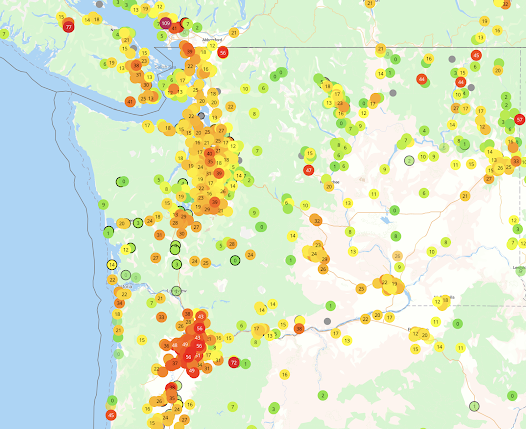The answer is no.
A single major snow event or even a major snow season does NOT mean that global warming is no longer a concern.
Similarly, a single weather event (e.g, the summer heatwave in June or the heavy rains in December) does not mean much about global warming.
This is a lesson that the media and some activists need to learn--on both sides of the issue.
Stevens Pass
Let's be honest--if we were experiencing an extremely low snowpack this year in the western U.S., the media and activists would be crowing about global warming. The familiar Seattle Times folks (e.g, John Talton, David Horsey, and others), the Guardian, and the Washington Post, among others, would be putting out the "existential" warnings about it (see David Horsey's cartoon). Grist magazine would do a feature article on snowpack decline and Seattle350 would schedule another protest in front of Chase Bank.
But this year they have been quiet.
Cartoon by David Horsey and provided by the Seattle Times
What is the Truth about Global Warming and the Cascade Snowpack?
For nearly two decades now, activists and certain politicians have claimed that the Cascade snowpack is disappearing rapidly, such as the suggestion by Mayor Greg Nickels in 2007 (in the Seattle Times) that the snowpack was already down by 50%:
"The average snowpack in the Cascades has declined 50 percent since 1950 and will be cut in half again in 30 years if we don't start addressing the problems of climate change now."
But what does the best science tell us?
Observations are quite clear: There has been minimal change in the Cascade snowpack over the past decades.
And we understand why.
And the best models are also clear. With increasing concentrations of CO2 in the atmosphere, our region will slowly warm and the snowpack will decline gradually during the remainder of the century.
Take a look at the data since the mid-1980s when a reasonable snowpack measuring network was established. For example, the April 1 snowpack average across the Cascades since 1984 shows lots of ups and downs, but no overall trend.
The trend of snowpack at Paradise on Mount Rainier since 1980 shows no trend.
Another measure of our snowpack is the melt-out day in mountain stations, with less snowpack and warming bringing an earlier melt out. Consider Stevens Pass at roughly 4000 ft (see below). The melt-out is trending LATER, which implies more snowpack.

So why is the Cascade snowpack holding nearly constant over the long term?
A hint comes from a plot of maximum temperatures for November through February over the western slopes Cascades (see below) for the past 50 years--exactly the period in which human-caused global warming should be noticeable.
Wow. Almost no upward trend in temperature! But lots of year-to-year swings.
We start with a relatively small global warming signal (about 1-2F of warming for the planet). And then the global warming is lessened in our region by the very slowly warming northeastern Pacific.
No wonder our snowpack is not changing much--the temperature of the air approaching the Washington Cascade during winter has hardly warmed.
What about the future?
I am heavily involved in high-resolution climate modeling for our region, and the best guidance suggests that with reasonable assumptions about increasing greenhouse gases (RCP4.5 for those who know about such things), the Cascade snowpack may well decline by about 1/3rd by the end of the century.
No more skiing at Snoqualmie Summit, less snowmelt over the summer for water supply. Precipitation will be higher, so we might need more reservoirs to store the winter rainfall.
Serious, but not the end of the world.
The Bottom Line
We now have an enormous snowpack this winter and many records have been broken, from BC to California.
But it doesn't mean much regarding long-term trends or whether global warming is having any impact.
So ignore any tweets that suggest that the massive snowfall disproves global warming. They are poorly informed.
And ignore the blaring headline in the Seattle Times, the Washington Post, or the Guardian that our snowpack is disappearing due to global warming. They are misinforming you for reasons we can only speculate about.










Comments
Post a Comment